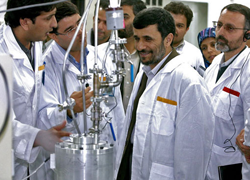
The International Atomic Energy Agency plans to release an updated report on Iran, in which the Agency is expected to announce its belief that Iran has now mastered the critical steps that would allow it to build a nuclear weapon. The report allegedly also says there is no evidence that Iran has decided to build nuclear weapons, and Iran has always maintained that it only maintains a peaceful nuclear energy program. The United States is not alone, however, in asking why Iran would acquire the materials and technology necessary to build nuclear weapons if it did not intend to do so.
The prospect of a nuclear Iran is often viewed as a destabilizing factor in an already unstable region. Israel and Iran have a history of negative interactions regarding this issue, including Israel’s 1981 use of bombers to destroy an Iranian nuclear reactor before it could come online. Other Arab states have supported efforts to curb Iran’s nuclear ambitions, and the Washington Post even describes the opposition to an Iranian nuclear program as a rare source of common ground between Israelis and Arabs.
If Iran has nuclear capabilities and those capabilities are generally regarded as dangerous, the inevitable question becomes what, if anything, we should do about it. The international community has imposed UN-backed sanctions since 2006, and the United States has imposed its own unilateral sanctions on Iran for nearly three decades. China and Russia have resisted a fourth round of international sanctions on Iran, and though Russia’s position may be softening, China remains opposed to the idea, largely because it views further sanctions as wasted effort.
The seeming failure of the sanctions regime has led some to suggest that only the threat of force will lead to any real change. Considering the other instability in the region, however, one has to wonder whether threats of further military campaigns would escalate an already tense situation. The United States has been pursuing a dual-track approach that includes a combination of sanctions and incentives.
The BBC suggests that more diplomacy is the route to take, though that may just be because there is little support for military intervention in this political climate. Meanwhile, a recent New Yorker article recommends containment through a combination of political, diplomatic, and military actions. One could expect such containment to include tougher economic sanctions, military posturing (particularly from Israel), and diplomatic pressure.
In light of the limited success any of these policies is likely to have, are any of these actions worth the risk? In the wake of the Arab Spring, is there a point at which a nuclear Iran, already feeling surrounded by military campaigns in Afghanistan and Iraq, will decide it has nothing else to lose?


